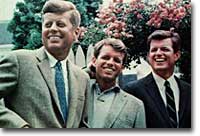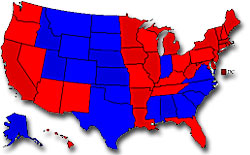4b. What Factors Shape Political Attitudes?

The Bush clan shows that politics runs in the family. George Bush Sr. was a Congressman, then the 41st President of the United States, George W. Bush was the Governor of Texas before being elected 43rd President and Jeb Bush was Governor of Florida from 1999 to 2007.
A common political culture by no means suggests that all Americans think alike. Some are conservative and tend to vote Republican. Some are liberal and tend to vote Democratic. Some have more negative attitudes toward public officials than do others. These attitudes determine how Americans participate, whom they vote for, and what political parties they support. Many factors — including family, gender, religion, race and ethnicity, and region — all contribute to American political attitudes and behavior.
Family
Despite family disagreements and generation gaps, children tend to grow up and vote the way their parents do. Families are generally the first, and often the most enduring, influence on young people's developing political opinions. As people grow older, other influences crisscross the family, and naturally their attitudes tend to diverge from those of their parents. However, the influence still remains. Logically, the more politically active your family, the more likely you are to hold the same beliefs. Just look at the Bush family. This relationship is less strong on specific issues — like school prayer, abortion, and welfare programs — but they all hold the same general political views.
Gender

The Kennedys are one of America's most politically powerful families, claiming members at all levels of government. Here, three of the Kennedy clan — President John, Attorney General Robert, and Senator Edward — smile for the camera.
Political scientists have noticed some major shifts in gender influence since women first got the vote in 1920. Through the 1950s women tended to vote for Republicans. Even though more women voted for Franklin Roosevelt — a Democrat — than for his Republican opponents, they still supported him by smaller margins than did men. By the 1960s, women began to shift their loyalty to the Democrats.
In recent elections women have voted strongly Democratic. Why? Most observers believe that women think the Democrats more strongly support "women's issues," such as equal work, equal pay, and equal legal rights. Polls indicate that many issues about which women feel most strongly, such as education and health care, are more favorably addressed by the Democratic Party. Does this voting behavior mean that women are likely to vote for female candidates for office? The evidence doesn't provide any clear evidence that they do.
Religion

Religious beliefs often sway the way people vote. The Christian Coalition of America represents the view that "people of faith have a right and a responsibility to be involved in the world around them."
Older studies dating to the late 1940s generally show that Jewish voters are more likely to support Democrats than are Catholics or Protestants. Catholics tend to be more liberal on economic issues (such as minimum wage and taxes) than they are on social issues (such as abortion and divorce). More recent studies have focused on how affiliates of the "Religious Right" differ in their political attitudes and behavior from everyone else. The religious right tends to support more conservative candidates for public office, and they are more likely to contribute to the Republican Party than to the Democratic Party. This tendency is more clearly associated with social issues such as school prayer, abortion, and divorce, than with economic issues or foreign affairs.
Race and Ethnicity
As a general rule, for the past half-century African Americans have been the most loyal Democrats than any other identifiable group. Some experts believe that this loyalty is weakening, but recent elections have confirmed the strong tendency for black Americans to vote Democratic. Latinos as a whole have a tendency to vote Democratic, but the relationship is not as strong as it is for blacks. To further complicate matters, the various Latino groups have very different voting patterns. For example, Cuban Americans overall have a strong tendency to vote Republican, and Mexican Americans have an equally strong tendency to vote Democratic. Some studies indicate that Asian Americans tend to vote conservative, but there is still a lack of concrete evidence to prove this.
Region

This map provides a statistical breakdown of the 1996 presidential election. Democrat Bill Clinton won states in red, while states in blue were won by Republican Bob Dole. Note that Clinton did well on the coasts of the country, while Dole took most of the mid-west.
As a general rule, people on either coast tend to be more liberal than those in the middle of the country. However, there are many exceptions to this tendency. Many Californians are archconservatives, as are a number of New Englanders. The Southeast presents some special problems with the rule, partly because their political affiliations have been changing over the past fifty years or so. The "Solid South" — the tendency to vote for Democrats, no matter what — began to erode during the 1950s, so that both Republicans and Democrats are competitive across the South today. However, recent presidential elections indicate a general support for Republicans in the South.
Tracking trends in political culture is very tricky. There is no "typical American." These factors and others are merely indicators of tendencies, yet there are many exceptions. In the end, Americans are influenced by a wide array of factors when they cast their secret votes on Election Day.






